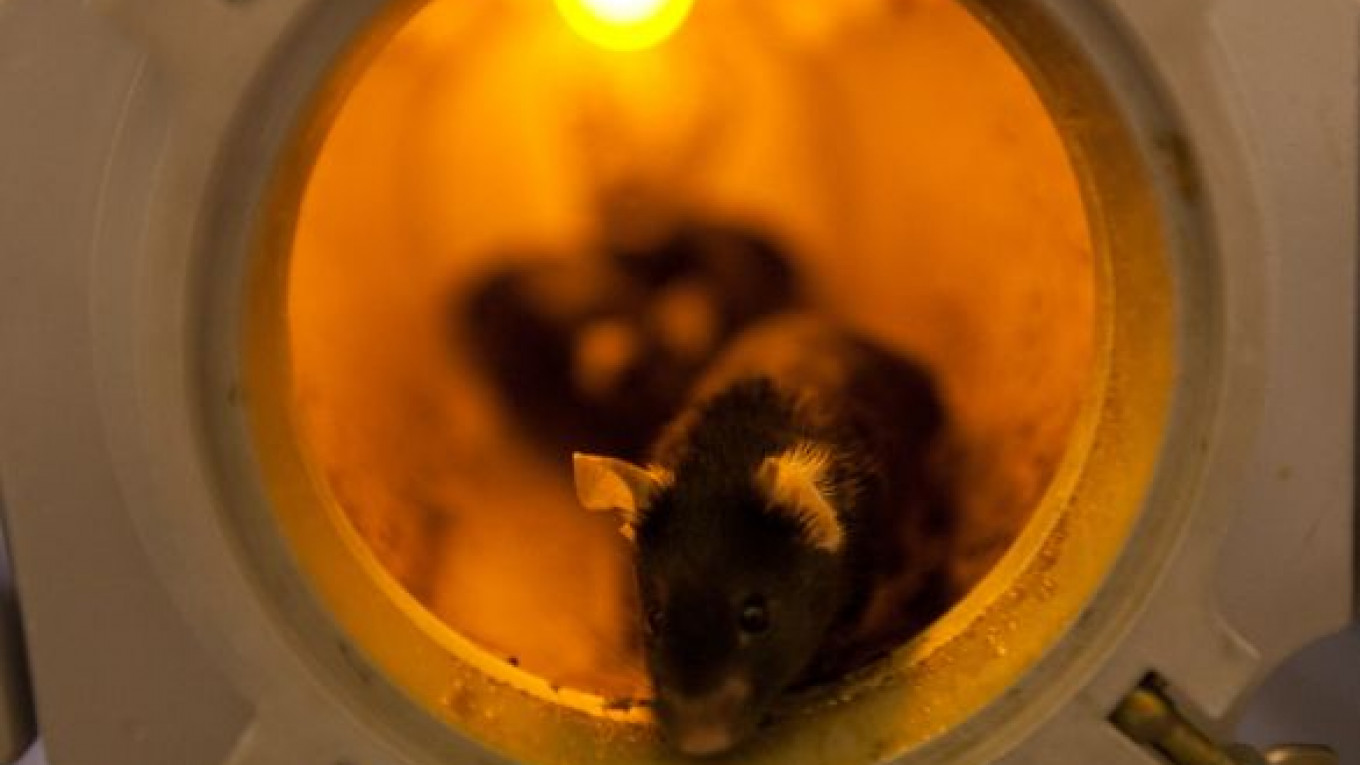A gang of various creatures is taking off for a space journey onboard a Bion-M satellite later this month, ending a 15-year hiatus in a high-profile program of using animals in orbital experiments.
The biological spacecraft will blast off from the Baikonur Cosmodrome on April 19 with contents that will most notably include mice, fish and bacteria spores, the mission's research supervisor said.
"A lot of questions have piled up," said the supervisor, Vladimir Sychev, as a key reason why the Bion program is resuming flights.
The government agreed to fund the 30-day mission — the longest time a Russian biomedical satellite will have spent in orbit — as part of its current 10-year Federal Space Program, which started in 2006.
Federal Space Agency chief Vladimir Popovkin said the Bion-M will fly higher than the International Space Station and help study the effects of exposure to stronger radiation on living organisms.
The satellite's orbit will be as high as 500 kilometers above Earth, compared with the average of 343 kilometers for the International Space Station, he said.
Bion flights previously had a ceiling of 300 kilometers.
Experimenting with animals on this new frontier, researchers will keep in mind possible human flights to the red planet.
"Missions to Mars will take place in conditions of high radiation," Popovkin said in an interview with the government's Rossiiskaya Gazeta published last week. "We need to study how it will affect living beings."
The high orbit will
allow for key research that can later be used in preparing for manned missions to Mars.
Studies of the 45 mice, which will live in several cylindrical enclosures, will be part of that plan, with the goal of determining how life adapts to radiation and zero-gravity, Sychev said. Russian scientists will look at the hearts, blood vessels, muscles, bones and brains of the critters, whose DNA is close to humans.
Mice have traveled to space countless times before. Their longest stay in orbit occurred in 2009 when six of them spent 91 days on the International Space Station for a bone-health experiment led by Sara Tavella at the University of Genoa, Italy.
On top of subjecting the mice to higher doses of radiation, Sychev said the Bion mission intends to give them more comprehensive examination than before. "It will be an attempt to aggregate what happens in individual tissues and the body as a whole during spaceflight," he said.
Gerbils, a type of rodents which come from arid habitats, will come under scrutiny for their ability to endure long periods without water. Studies of the creatures will show how zero gravity affects the balance between salts and water in their bodies.
One more experiment will endeavor to shed light on how life emerged on Earth. The spacecraft will have an outboard attachment of basalt rocks infested with bacteria spores, in a test of whether the cells will survive the ultra high temperature of reentering the atmosphere. If they do, it will corroborate the theory that life came to Earth on the back of a meteorite, Sychev said.
In another experiment, Germany's OmegaHab aquarium will fly onboard Bion in a test of how fish endure gravity-free conditions, with an aim to see if fish are fit for traveling alongside humans in spaceflights — as something that may end up on the menu.
"Fish could turn out to be an important element of a life-support system in future spacefaring," Sychev said.
Geckos and snails will also be part of the orbital menagerie.
Researchers from NASA and several U.S. and German universities will have access to the biological specimens when the animals and spores return to Earth. Sychev, who is a researcher at Moscow's Institute of Medical and Biological Problems, a part of the Russian Academy of Sciences, said the extent of scientific cooperation to study the mission's experiments is astounding.
"Such a broad range of participants is virtually unattainable at the International Space Station," he said. "Research that happens there is more isolated."
NASA representatives could not immediately comment.
The Russian Space Agency will launch the biological satellite, produced by TsSKB-Progress, onboard a Soyuz rocket. An agency spokesman declined to name the cost of the mission.
The Bion waiting to take off is different from its predecessors. It has a new environment control system, greater payload capacity and solar batteries, whose energy will extend orbit time.
The reasons to perform these experiments on an independent spacecraft rather than the International Space Station include potential contamination hazards from some of the payloads if they encounter some sort of failure during the flight. In addition, a satellite like Bion ensures full exposure to radiation, which serves the purpose of the studies better.
Sychev said the next Bion could hopefully go orbital before 2017, if this mission goes well.
Contact the author at medetsky@imedia.ru
Related articles:
A Message from The Moscow Times:
Dear readers,
We are facing unprecedented challenges. Russia's Prosecutor General's Office has designated The Moscow Times as an "undesirable" organization, criminalizing our work and putting our staff at risk of prosecution. This follows our earlier unjust labeling as a "foreign agent."
These actions are direct attempts to silence independent journalism in Russia. The authorities claim our work "discredits the decisions of the Russian leadership." We see things differently: we strive to provide accurate, unbiased reporting on Russia.
We, the journalists of The Moscow Times, refuse to be silenced. But to continue our work, we need your help.
Your support, no matter how small, makes a world of difference. If you can, please support us monthly starting from just $2. It's quick to set up, and every contribution makes a significant impact.
By supporting The Moscow Times, you're defending open, independent journalism in the face of repression. Thank you for standing with us.
Remind me later.






